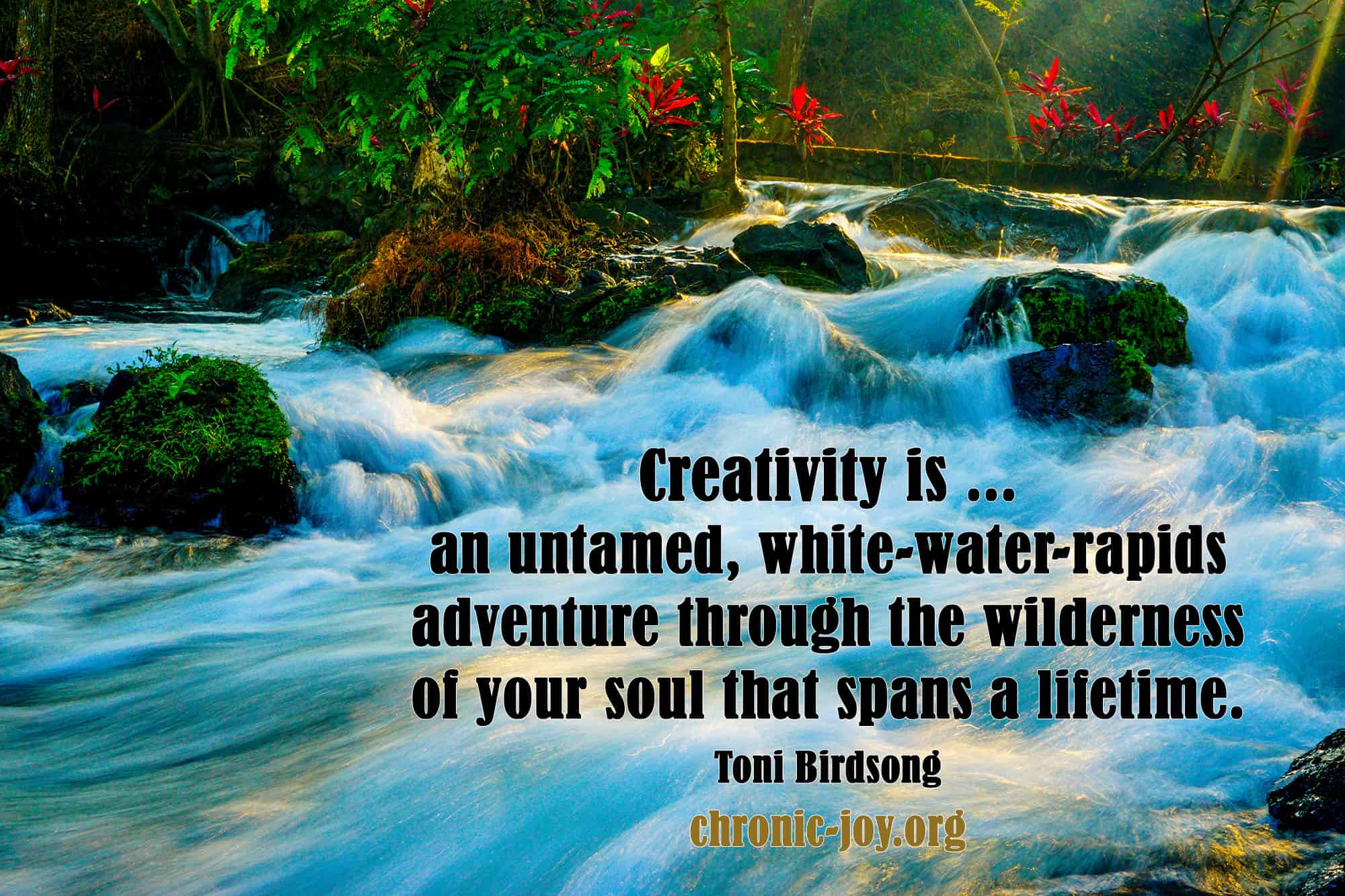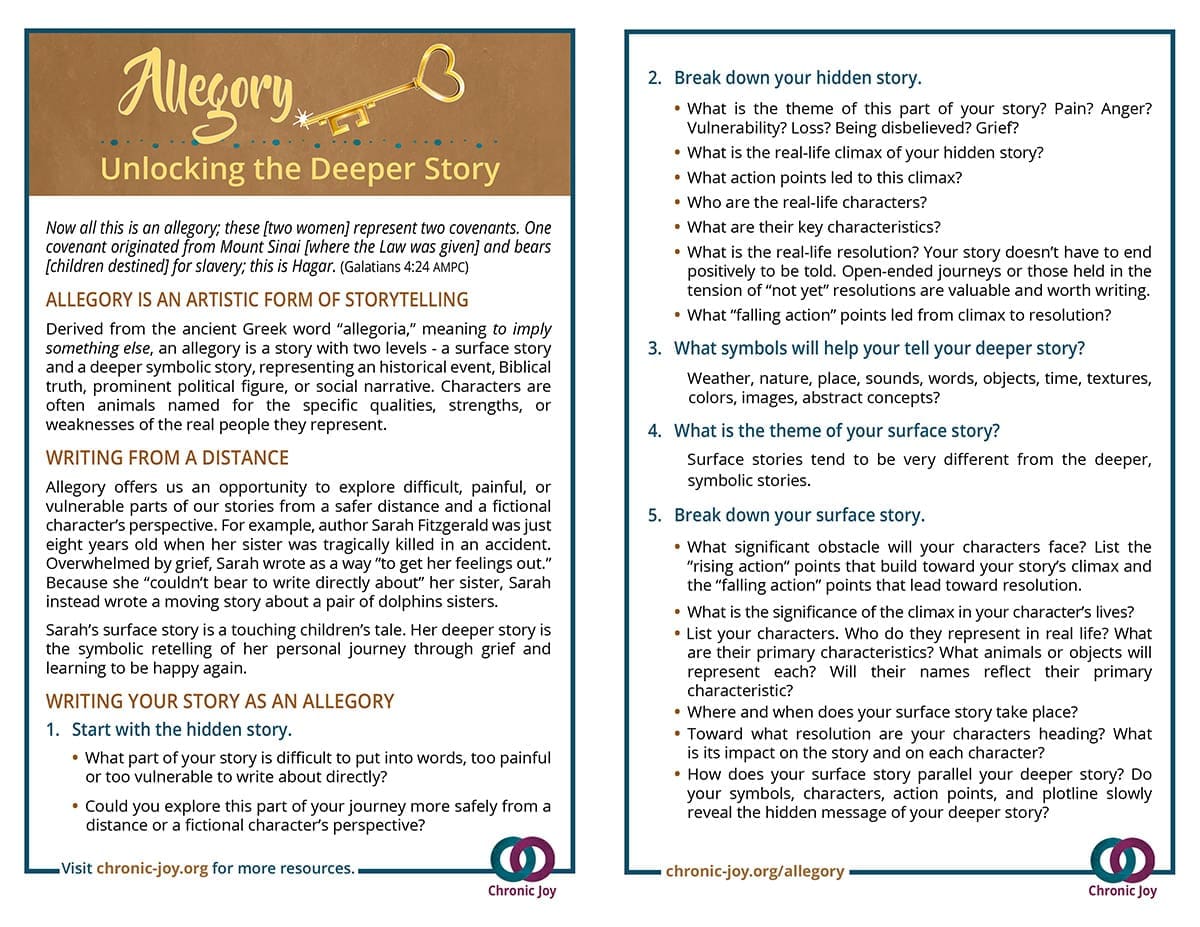
“Creativity is … an untamed, white-water-rapids adventure through the wilderness of your soul that spans a lifetime.” Toni Birdsong
Think again.
Whether we realize it or not, God designed each one of us with the ability to create. Time and again in Scripture, God affirms His desire that we explore, enjoy, and echo the infinite galaxies of His heart.
Our creativity stems from our Father—who is the greatest Creator the world has ever seen. In fact, the first act in recorded history is God creating. In Genesis 1:1 we find out that “In the beginning, God created the heavens and the earth,”—and Genesis 1:26 is where you and I come into the creation equation: “Then God said, ‘Let us make mankind in our image, according to our likeness . . . ”
Those two verses help us see three things:
- God is so creative
- He deeply desires a relationship with us
- He’s given us permission to explore and reflect His creative attributes.
So why do people have so much trouble accepting and tapping into their God-given ability to be creative? Why do many songs, stories, ideas, recipes, and experiences wither away inside us?
Perhaps your creativity took a hit at an early age because someone repeatedly put you at the math table instead of the art table, or mistook your clay cat for a horse. Maybe you quietly began to shrink back as others began to shine brighter than you in art, writing, drama, or music. Possibly you’ve become comfortable in your routine and see creative endeavors as a waste of valuable time.
No matter why your internal symphony has gone silent, it’s never too late to poke around the right side of your brain and turn the creative tides in your favor. Can you imagine how your life might look if you ventured outside your creative comfort zone more often?
10 Ways to Unlock Your God-Given Creativity
1. Change your story.
Acknowledge your God-given ability to create, as well as the glory you bring God through creating. Artist Michelangelo understood both the source and power of his art when he said: “The true work of art is but a shadow of the divine perfection.”
Once you permit yourself to explore your creativity, something beautiful happens: you start to tell your untold stories.
It’s inevitable. Stories begin to flow in some form or another whether through words, colors, sounds, spices, or movement.
Author and researcher Brené Brown addresses this idea of letting go of others’ standards in her book, Rising Strong: “We must care for and nurture the stories we tell ourselves about our creativity and ability. Just because we didn’t measure up to some standard of achievement doesn’t mean that we don’t possess gifts and talents that only we can bring to the world. Just because someone failed to see the value in what we can create or achieve doesn’t change its worth or ours.”
2. Silence your inner critic.
We have an inner critic who whispers into our ear before a new idea even spreads its wings: Satan. Your inner critic will try to convince you that you don’t have the time, money, patience, credentials, or talent to venture into the creative unknown.
Don’t listen to the king of lies: God’s Word is packed with truth about who you really are.
“And he has filled him with the Spirit of God, with skill, with intelligence, with knowledge, and with all craftsmanship, to devise artistic designs, to work in gold and silver and bronze.”
Some of us have been listening to our inner critic for so long and so casually that God’s Truth is a whisper we hardly hear anymore. Author Ken Gire helps us realize how crucial it is to align our creative spirit with God’s: “Joy comes when we catch the rhythms of God’s heart. Peace comes when we live in harmony with those rhythms.”
So here’s a test: ask yourself if the thought you are thinking falls into the rhythm of God’s heart. When that imposter-authored thought arises saying, “No one would read a book if I wrote it. What I have to say isn’t that important,” see that thought for what it truly is: a lie planted by a thief who wants to steal the hope God has planted in you.
Live and create within the rhythms of God’s heart and His truth, and soon that critic will zip it.
3. Revolutionize your language, reimagine yourself.
Words fuel your thoughts which give feet to your actions. When you change the way you see yourself, then the things you say about yourself need to follow suit.
Why are some people deemed “creative” and others “not creative?” One reason: creatives say they are creative. They are creative because they say they are.
What sounds more convincing?
- “That canvas? Oh, it’s nothing. I’m just trying to paint a silly tree, but it looks more like a three-year-old did it.”
- “I’m becoming a painter. That is my latest work.”
“Death and life are in the power of the tongue, and those who love it will eat its fruits.” (Proverbs 18:21)
You bear the stamp of God’s creative likeness, and the sky’s the limit—just be mindful that your words don’t shoot down your hope as it climbs.
When author Patsy Clairmont moved to Tennessee from her home state of Michigan, she was looking forward to slowing down, sitting on her porch, and enjoying a little rest after a rewarding career as an inspirational speaker—but God surprised her with an explosive creative season in her life. Just a few years later, at 71, Clairmont is a tour-de-force of creativity and fills her time with painting, poetry, songwriting, and even teaching creativity workshops in her home. Clairmont says creativity begins with asking God to help you reimagine yourself:
“You are more than you know because God is greater than you can imagine! Let Him prove that to you. Begin by stopping to consider the dreams that can still come through for you.”
4. Trust the process.
What is the creative process? It’s coming back to the page, back to the canvas, back to the kitchen—over and over and over again.
Creativity is not a ticketed event or a course with a pass-fail grade. It’s an untamed, white-water-rapids adventure through the wilderness of your soul that spans a lifetime. On that ride, you will have highs and lows. When you keep trying at something, you’ll inevitably have successes and face-plants.
In creativity, the process is where the magic happens. Writer Ursula Le Guin once said: “It is good to have an end to journey toward, but it is the journey that matters in the end.”
Creativity thrives and picks up momentum in the rewrites, the paint spills, and the stage fright. So throw out your expectations, and throw open the door to creative collisions and mishaps. Look around at all the incredibly creative things in your home. From the iPhone to the toaster, each successful innovation has an invisible story of failure attached to it.
5. Employ all five senses.
It’s difficult to create all the time or be expected to create on demand. Feeling empty, distracted, or fatigued can place roadblocks in your creative journey.
God knows that.
One reason God gave us five senses is so we could experience His creation in all kinds of ways and keep our wells filled to the brim. Beauty and inspiration are all around you—sometimes you just have to look beyond what’s in front of your face. Take the time to listen, look, and linger. Walk outside, pick up a leaf and study it for a moment: take in its tiny veins, its silky touch, its green smell. Listen to music with your eyes closed. Walk barefoot through freshly-mowed grass. Try a new recipe and let the combination of spices roll around your tongue.
Author and creative Donald Miller writes in his Storyline blog that it’s up to the artist to see what others ignore: “God put plenty of beauty in the world. It’s the artist’s job to find something beautiful, dig it out of the clay and clean it up for presentation.” Take one step deeper below the surface. You may be surprised by what you find.
6. Consume creativity.
The saying “You are what you eat” applies to so much more than food—it applies to our thoughts, too. What we consume with our eyes and ears sinks into our psyche and either inspires or depresses our minds.
Want to hone your creativity? Get on a “media diet.”
Think about what you’re putting into your heart, soul, and mind, and decide if it has earned a right to stay. Jesus said, “Your eye is the lamp of your body. When your eyes are healthy, your whole body also is full of light. But when they are unhealthy, your body also is full of darkness. See to it, then, that the light within you is not darkness.” (Luke 11:34–35)
Make sure your media diet—the books you read, the music you listen to, the movies you watch—is rich in creative nutrients.
Try the “Choose this, not that” game to get you rolling. For instance, instead of a Netflix binge on movies, chose a few films with artistic storylines or stellar screenplays. Instead of reading a romance novel, pick up a book of poetry. Instead of a Target run, go to an art museum or a local music venue for a live show.
Just like caring for a garden, creativity will thrive when you give it what it needs to grow.
7. Rescue your childlike spirit.
When you create anything, you reach inward and upward for fresh revelation—and when you approach that process with humility and wonder, you can experience glimpses of God’s kingdom here on earth.
In Matthew 19:14, Jesus told his followers “Let the little children come to me, and do not hinder them, for the kingdom of heaven belongs to such as these.” Even our Savior understood the importance of approaching the world with a childlike spirit.
When you possess a childlike spirit, creativity flows far more naturally. Childlike means you approach creative work with wide eyes and a tender, inquisitive, insatiable spirit. It means you approach the unknown with more whimsy than worry, with more love than censure, and with more grace than precision. To be childlike means you are teachable and resilient and can giggle over any messes you make along the way.
Adulthood adds layers to the once joyful, play-prone heart you enjoyed as a child. To salvage creativity, you have to rescue that beloved child that sang out of tune and built lopsided volcanoes out of crushed-up Oreos.
8. Honor the itch.
“God keeps putting this idea on my heart and I can’t shake it.” Some call that a nudge or a wink. Others call it an itch because it’s almost annoying if you ignore it.
To save you the suspense: the itch wins—the itch always wins.
Whatever you call it, honor it—because chances are if God plants a creative seed in your heart and mind, you will not rest easy until you nurture it to some degree. Most creatives know the joy as well as the pain of Proverbs 13:12: “Hope deferred makes the heart sick, but a longing fulfilled is a tree of life.” The tree of life represents meeting a deeply-felt desire. On the flip side, when we ignore or defer that hope or deep desire, it can be heartbreaking and even take a physical toll.
God positions holy, creative ideas in us for this reason: to know Him better and to bring Him glory. So, when you get the itch, don’t ignore it—honor it, obey it, and thank God for it.
9. Stop the comparison game.
In our digital culture, it’s never been easier to play the comparison game—and to forget how unique and beautiful God has made each of us. It’s easy to surf the Internet and find a million people who seem prettier, smarter, and more interesting than you — but you know what? The comparison game is not a healthy game to play.
“I am fearfully and wonderfully made; marvelous are Your works, and that my soul knows very well.” (Psalm 139:14) According to the NKJV Study Bible, “fearfully and wonderfully” could also be translated as “I am an awesome wonder.”
When is the last time you called yourself an awesome wonder? Looks like God beat you to it.
How do you combat the comparison trap that so easily obliterates your confidence? The same way Jesus did: call out lies with God’s Truth.
The truth is you are one-of-a-kind and beloved. Every time you set out to create something yourself, you can enjoy the companionship of the One who created heaven and earth—but it takes some work. Every day, you have two choices: Will I befriend a comfortable lie, or will I believe God has created me and called me to do this in a way only I can do it?
10. Keep the main thing the main thing.
Proceed with caution: the right brain is wild, all-consuming, and wonderful, but it can also commandeer the ship if you are not careful.
Once-important priorities can get fuzzy. Affections get misplaced. The temptation to forsake responsibility for art is a hard one for many creatives because they tend to get lost in their passions.
Thankfully, when this happens we can course-correct by remembering Colossians 1:16: “For in Him all things were created: things in heaven and on earth, visible and invisible, whether thrones or powers or rulers or authorities; all things have been created through him and for him.”
Patsy Clairmont addresses this creative quandary in her book, You Are More than You Know: “When our artistic results become our sense of worth, we miss the point of our value, which is not based on what we do, but whose we are. We need to understand if we could not paint one more picture, write one more poem, cook one more dinner, entertain one more weary traveler, we would still be loved.”
God put you on this earth to love and be loved. While we know His love never fails, remember that though you can love others through your art, you also need to love them, period. That means stepping away from the canvas, the instrument, the kitchen, and filling the needs that others may have. Balance is key to creativity—and the muse will still be there when you step back to the right side of your brain.
There you have it: ten steps to reclaim your creativity. So buckle up! Unlocking your God-given creativity here on earth might be one of the grandest adventures of your life. Take time to play, to imagine, to dream. Find the rhythms of God and fold in.
Express love for your Creator on the page or the canvas, on the stage, in the kitchen, in a song, and enjoy the process of discovering His overflowing goodness.
10 Ways to Unlock Your God-Given Creativity first published at Coloring Faith. Published with permission.
QUESTIONS FOR REFLECTION
- What does creativity mean to you? How would you define it?
- What inspires you?
- What one thing catches your attention right now? Why? How would you describe it?
- What materials do you have at your fingertips? How could you use them to creatively express a part of your story today?


Toni Birdsong
Author
Toni is an author, blogger, and owner of Birdsong Creative, a branding and web agency outside of Nashville, Tennessee. She’s been riding the creative white waters professionally for more than 25 years, including with The Walt Disney Company, where she was an Imagineer. Toni is the author of @stickyJesus: How to Live Out Your Faith Online.

Allegory • Symbolic Storytelling
Allegory is a beautiful, artistic form of storytelling that offers us an opportunity to explore difficult, painful, or vulnerable parts of our stories from a safer distance and a fictional character’s perspective.

Recent Comments